- Home
- Neal Stephenson
Zodiac Page 17
Zodiac Read online
Page 17
While I was gone, someone had put some clippings on my desk about that jackass Smirnoff. The Terrorist Boy Scouts had held their first meeting and invited all the local press, one or two of whom had shown up. Smirnoff had issued a statement, a rambling statement, just what I’d expect, alternately heaping shit on GEE’s head for being too conservative and praising our direct-action techniques. One of the clippings had a photograph, and I could see the back of a member’s head, staring up adoringly at Smirnoff, and I was just positive it was Wyman, the guy who had shifted into reverse on the freeway. So I tried to get ahold of him for a while, but he had moved out of his old place and no one knew where he was.
“He’s very secretive,” his old roommate explained, “because the FBI is after him.”
“Big fucking deal,” I said, miffing the hell out of his unindicted co-conspirator.
I spent the rest of the afternoon writing letters and press releases denouncing the likes of Smirnoff and his idol, Boone, and explaining, in very short sentences, the differences between us and them. Then I trashed them, had the computer wipe them out. They’d never see print, because we don’t talk about people like Smirnoff, we just ignore them.
I did have some fun during that first week back. No big actions on the way, no court appearances, no wrecked cars. I mixed up a shitload of papier-mâché and added a new mountain to my train set. I hocked a few more shares of my old Mass Anal stock and bought an antique locomotive. Bartholomew and Debbie and Tess and Laurie and I played a few hundred badminton games after work.
But the most fun of all was when Esmerelda sent me a copy of a photo from the July 13, 1956, Boston Globe, second page of the Business section. It was a picture of Alvin Pleshy, back in his squirrelly, young-engineer days, in Basco’s main facility on Alkali Lane. I recognized the building just by its size: it was their big Chloralkali plant. Same process that had ruined Niagara. They made a lot of chemicals, so they needed a lot of power. They needed equipment that could handle the power fast. That meant big equipment and lots of it—huge transformers. Many transformers, each the size of a two-car garage.
“NEW EQUIPMENT FOR BASCO. Alvin Pleshy, Senior Engineer, supervises as modern equipment is installed in Basco’s Everett facility. The equipment will be used in the production of industrial and agricultural chemicals.”
Which will be sprayed over most of Vietnam, I mentally added. But the caption didn’t matter, I was looking at the photo. Anyone could see that we weren’t dealing with just any “equipment” here. We were talking whopping transformers. They were being lowered through holes in the roof.
The fact that Basco bought a bunch of new transformers in 1956 was not interesting to me. What was interesting was that they had had to get rid of some old transformers to make room for the new ones. And all of them had probably been full of PCBs, hundreds of thousands of gallons of the bad stuff. Basco had been having PCB problems for years, but nothing of that magnitude.
Pleshy had stashed away a lakeful of toxic waste somewhere, and he’d been keeping it under his belt for thirty years. I wonder if he thought about it at night. I wonder what the stockholders would say when I informed them of it, sent them copies of this photograph.
Suppose they’d taken those transformers and just dumped them on the floor of the Harbor somewhere. Or taken them to one of their lots and covered them with dirt. Sooner or later they’d bust open and then all hell would break loose. It might take a long time—say, thirty years. But it would happen.
And they’d know about it. They’d be sitting there, waiting, worrying. Maybe worrying enough to cover the site with some goons in a Cigarette.
Pure speculation. But it might explain the lobster. Unfortunately, it didn’t explain the disappearing PCBs.
I looked at the photo again. Pleshy was smiling that big bright smile that hasn’t been seen anywhere since the Fifties. Twelve years later, when he read about the rice oil in Kusho, I’ll bet the smile wasn’t there.
But there were plenty of smiles at Biotronics, at least for the first ten minutes or so. Laughlin actually sent a car around to pick me up. He said he’d feel terrible if I got run over riding my bike to their offices. Either he was indiscreet as hell, or he wanted to let me know that he knew a lot about me.
So it was high time for me to learn a lot about Laughlin, and I had a few ways of doing that. Most of them would have to wait until after the meeting, though, so I rode, relatively ignorant, in a big fat company car out to a high-tech office building along the river, not far from Harvard. Not even that far from where I lived. Took the elevator up to the top floor and found Biotronics easily, by following its smell. They were using solvents in there, mostly for cleaning and sterilizing stuff. Ethanol and methanol. Some kind of disinfectant with an aromatic perfume added to make it smell more impressive. Whiffs of hydrochloric acid, probably used for heavy-duty cleaning. Sweet acetone. None of this was unusual, just the basic lab odors. No wonder they were on the top floor; they’d use hoods to contain the toxic stuff, and then exhaust it all out vents in the roof.
Laughlin met me at the door, swooped his right hand around like a Stuka dive bomber and nailed me with a gym teacher’s handshake and a game-show host’s smile. And on top of all those other odors, a wave of familiar cologne rolled up my nostrils.
But he wasn’t wearing a shoulder holster at the moment. And you could buy that perfume at any sufficiently pretentious store. Or, if you had access to a gas chromatograph, you could manufacture it yourself at a hundredth the price. So I had to take it easy here and not jump to any paranoid conclusions. Big guys and big revolvers didn’t necessarily go together. I wiped my hand on my jeans, discreetly, then followed him past all the smiling secretaries, the cheery bottle-washer pushing a cartload of glassware, the unresponsive Xerox repairman, the hale-and-hearty fellow executives, blah blah blah. Being in an office just makes my skin crawl. All that good cheer. All that fine wool, the processed air, the mediocre coffee, fluorescent tubes, lipstick, new-carpet smell, the same fucking xeroxed cartoons tacked on the walls. I wanted to shout: one Far Side on the door does not an interesting person make. But somewhere back in here they had a lab, which made it a little better.
Not much of a lab, as it turned out. They had a gas chromatograph, sort of a cheapie, and some other analytical machines, and they had one very odd piece of work, up against a wall, called a Dolmacher. He held a printout in his hand and was moving his lips.
“S.T.!” he shouted, somewhat too loud, blinking spasmodically as his contact lenses tried to catch up. “Sorry we didn’t see you on Saturday.”
“I was in Buffalo. Did you kill anyone?”
“Yeah! Nailed an R.O.T.C. cadet right behind the ear. From thirty yards. God, was he embarrassed.”
“Yeah. So this is where you work?”
“Part of the time.”
“Where’s the DNA sequencer? Where are the big bug-growing tanks? Where’s the tobacco that glows in the dark?”
“We’re in Cambridge,” Laughlin said, managing to crank out a surprisingly throaty laugh.
“Oh, yeah. And people like me have ruined it for people like you.”
“God, S.T.,” Dolmacher said, not quite whining, “you guys really made it tough on us in this town. We can hardly even have offices here.”
“Wasn’t me,” I said. “Genes aren’t my bailiwick.” Years before, another bunch of duck-squeezers had rammed through some laws making life hard for genetic engineers in Cambridge.
“That might be true now, S.T.,’” Laughlin said, “but it’s about to change.”
“Yeah, I’ve been getting all kinds of dark hints to that effect.”
Laughlin jerked his head toward the exit, letting his politeness drop for a second. I guessed that meant we were leaving now. Dolmacher followed automatically.
“Where’s the rest of it?” I said, killing time as we wandered down the hallway.
“Unfortunately we don’t have a consolidated facility at this point in time,” L
aughlin said. “Depending on various environmental regs, we have different parts of Biotronics scattered around the area. This is the headquarters. And as you saw, we have a small analytical lab.”
“Small molecules only?”
“Small molecules only,” Laughlin said, then turned and fixed me with a glare over his shoulder. “Sangamon’s Principle.”
I couldn’t believe this fucker. He’d been twisting my dick this entire time and I hadn’t even figured it out until now. He was just begging me to punch him in the nose so that he could throw all those big uncoordinated Nautilus muscles into action. And then call his lawyers.
He ushered me into a conference room. I sat down with my back to the window. Laughlin closed the door and Dolmacher hovered.
“You know, Laughlin, you’re the nicest guy who’s ever hated my guts,” I said.
He laughed freely, the laugh of a man with a clear conscience. “I doubt it.”
Dolmacher just swiveled back and forth like a spectator at a tennis match. Me, I was trying to avoid going into a fight-or-flight reaction. I drank some of their ice water—natural spring water, of course—and breathed slow, trying to keep my vocal cords nice and loose. I was wondering if Laughlin had done it—killed Scrounger—or those two pricks, Kleinhoffer and Dietrich. Or all three.
“Well! Shall we get started with the presentation,” Dolmacher hollered.
“Got any kids, Laughlin?” I asked.
“I think you’re going to find this interesting,” Laughlin said.
“Should we tell him about the secrecy thing?” Dolmacher asked.
“This research is not generally known,” Laughlin explained, “for competitive reasons.”
“Competing with the police?”
“With all the other players in this industry. Of course, you can say anything you want about this meeting, after you’ve left, but we’ll just deny it. And all it will do is give a slight edge to our competitors.”
“Okay,” I said. “Let’s get this shit over with. We’re all busy people. You guys have been working on some kind of genetically engineered bug that deals with the organic chlorine problem.”
“Actually, yes,” said Dolmacher.
“I’d guess you got yourselves some time on a Cray supercomputer, or something, and did some kind of heavy quantum mechanics, worked out a rough numerical-solution Hamiltonian for chlorine, devised some kind of transition state between covalent and ionic, figured out a way to introduce an electron into those chlorines to make them ionic again. Some reaction that could be carried out by a string of genetic material—what do you call it?”
“A plasmid,” Laughlin said.
“A plasmid that could be introduced into a bacterium and therefore reproduced in unlimited quantities. And now you want to get approval to use this thing to clean up toxic waste spills. Turn all that covalent chlorine back into salt.”
“Sheesh,” Dolmacher said, and not for the first time.
“You want a job, S.T.?” Laughlin said.
“I could use one. Need to replace my computer.”
“That’s a shame.”
“Yeah. The Mafia sent a hardware engineer around to bust it.”
For once, Laughlin had nothing to say. He was just a little rattled, or pissed. Probably thinking that he’d been kind of stupid, here and there, along the way.
“You should buy one of the new ones,” Dolmacher said. “With the 80386 processor. Hottest thing going.”
“You bastards. You already did it, didn’t you?”
Laughlin checked his Rolex. “Let me see. Two weeks, three days, and about four hours. It took you that long to figure it out?”
“Took your magic bug and dumped it into the Harbor. Ate those PCBs right up. Turned them into salt.”
Laughlin shrugged. He had his eyebrows way up on his forehead now, up there in the zone of total innocence. “Is there some problem with that?”
“Tell me. How long since Dolmacher put this bug together for you? A month or two? When I talked to him at the yacht club, he wasn’t finished with it yet. He said he was working on the Holy Grail, not finished with it.”
“Something like that.”
“Jeez, S.T., chill out.”
“How much testing did you do on that bug before you put it into the environment?”
Laughlin shrugged. “Wasn’t necessary.”
“I think the EPA would disagree.”
“Don’t insult my intelligence by talking about them.”
I snorted. “Alas, we agree, Laughlin. But didn’t you even think about the dangers?”
He grinned. He had me. “What dangers? The bug eats covalent chlorine compounds. S.T. That’s its food. When it’s eaten them all—when the Harbor is perfectly toxin-free—it starves to death. End of bug.”
“Yeah, I get the secret message loud and clear. If I go out there and try to get evidence—to find some of these bugs and blow your company away—I won’t find zip. They’re all dead.”
“Which is fine, isn’t it? Because we don’t want genetically engineered bugs in the environment.”
“And we don’t want PCBs either,” Dolmacher reminded us.
Laughlin smirked at Dolmacher behind his back.
“You guys went out and stopped pollution, huh?” I said, beating him to it.
“We stopped pollution. No PCBs left in the Harbor. No bugs either. No evidence to harm our company. The only person who’s screwed is you, S.T.”
Suddenly Dolmacher turned nasty. “Yeah, S.T., you’re screwed.”
“Everywhere except in bed,” Laughlin added.
“Laughlin, my man,” I said, “I didn’t realize it was going to be that kind of fight.”
He dropped into a boxing stance, waved his guard around, snapped a big meaty right hook into thin air. “Fight’s over,” he said. “First-round knockout. Ever do any boxing, S.T.?”
“Nope. I prefer to kill helpless animals.”
Dolmacher cleared his throat with a sound like pebbles rattling in a can. “What we’re hoping is that we can get you on our side.”
“That’s not what we were going to say, Dolmacher,” Laughlin said. “We were going to say, ‘What we’re trying to demonstrate is that we’re already on the same side.’”
“You and us,” Dolmacher continued, right in stride.
“Lumpy, you ever get your boss up there for the Survival Game?” I asked. “I could slip you some dum-dums.”
“It’s a stupid game,” Laughlin said. Dolmacher looked a little wounded.
“All your boss’s ammo is on the bottom of the Harbor,” I said. “In his chrome-plated revolver.”
“I got a new one,” Laughlin said, “even bigger. To protect myself from terrorists.”
“How’s your son?” I asked. “The Pöyzen Böyzen fan. He been spending a lot of time on the Nautilus lately?”
“Christopher lacks the maturity for a concerted power-building program,” Laughlin said, showing a little tension.
“I’ll say. He and I had a chat, out there on that big mound of garbage in the Harbor, where he hangs out with the rest of the Junior Achievement League. How old is he—fourteen, fifteen?”
“Seventeen.”
“Oh. Well, I was impressed with him. He throws a mean beer bottle.”
“Thank you.”
“What’s his ambition, then? Arsonist?”
Laughlin started for me, quick little boxer’s steps. I just sat there. Harder to punch a guy’s face when it’s down around your waist.
“Think about lawyers, Laughlin,” I said. He did, and he stopped.
“Let’s get to the end of this,” I said, “because we’re both about to kill each other. You want me, noted eco-asshole Sangamon Taylor, to come out and say that your PCB-eating bug is a good thing. That it should be rushed into general use right away.”
“All of which is the God’s truth,” Dolmacher said.
“Before you ever used that bug, you knew I might fuck it up for you. You hear
d from Christopher that I was hanging out on Spectacle Island, and you were afraid that I’d discover the old Basco transformers leaking PCBs there.”
“Continue.”
“The ones buried under the north shore of the island. The ones that accidentally got ruptured by that old barge during Hurricane Alison, and spilled a whole lake of PCBs down into the Harbor. You were afraid I’d figured that all out. Which, actually, I hadn’t. As you noticed, I can be pretty slow sometimes. But you tried to scare me off, to slow my investigation down, so that you could use the bug to wipe out the evidence before I went public.”
“And it worked.”
“It worked fine. The question is: did the bug really eat all those PCBs? What about deep underneath that old barge? Maybe there’s an unruptured transformer down there. Or maybe there’s a pocket of bugs down there, still working on some PCBs, bugs that I could sample and show before the public. You’re still worried about that. You want me off your trail, you want me on your side.”
“Why shouldn’t you be on our side?” Dolmacher said. He really meant it. “S.T., there are no covalent chlorine compounds left in Boston Harbor. Isn’t that what you wanted?”
“Sangamon’s Principle,” I said. “This plasmid, it’s a huge molecule you’re messing around with. You don’t know what it’s going to do. The answer is no.”
Laughlin didn’t bother to show me out. Dolmacher followed me, going on about the Survival Game, until I body-checked him into a wall. He gave me a vacant yet somehow piercing look, and as I rode the elevator down, I got to thinking that Dolmacher was nothing but a big complicated molecule himself, and you never knew what he’d do either.
21
Rebecca came around for our appointment about half an hour after I got back. I’d forgotten about it. Damn it, I was still just stewing in my emotions, trying to wash Laughlin’s perfume off my hand. I hadn’t had time to consider anything. I wanted to tell all, but first I had to come up with a plan. I shoved my clippings under some other crap when I heard her voice approaching; she walked in and said she had some interesting stuff for me.

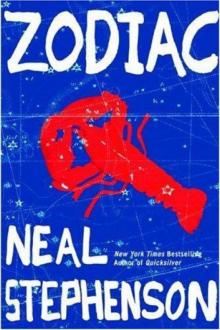 Zodiac: The Eco-Thriller
Zodiac: The Eco-Thriller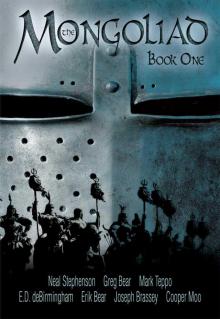 The Mongoliad: Book One
The Mongoliad: Book One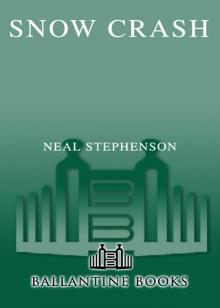 Snow Crash
Snow Crash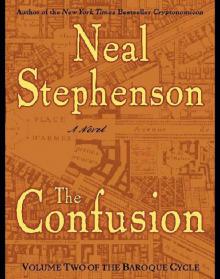 The Confusion: Volume Two of the Baroque Cycle
The Confusion: Volume Two of the Baroque Cycle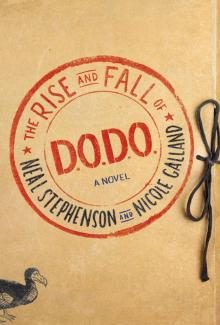 The Rise and Fall of D.O.D.O.
The Rise and Fall of D.O.D.O.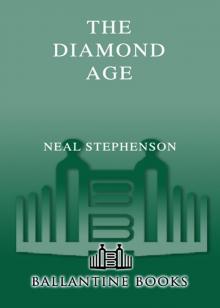 The Diamond Age: Or, a Young Lady's Illustrated Primer
The Diamond Age: Or, a Young Lady's Illustrated Primer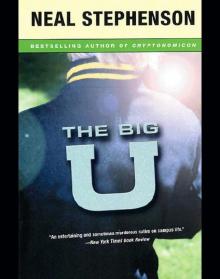 The Big U
The Big U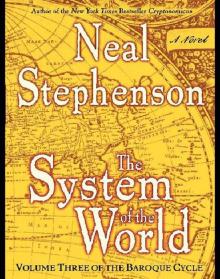 The System of the World: Volume Three of the Baroque Cycle
The System of the World: Volume Three of the Baroque Cycle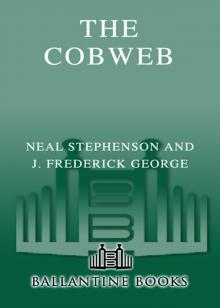 The Cobweb
The Cobweb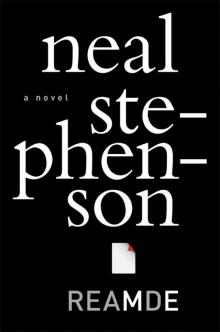 Reamde
Reamde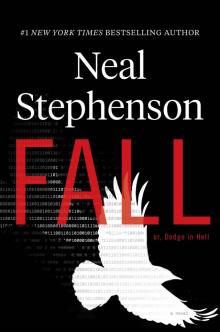 Fall; or, Dodge in Hell
Fall; or, Dodge in Hell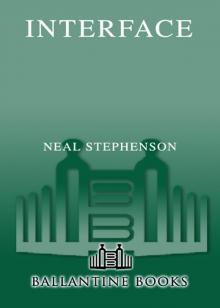 Interface
Interface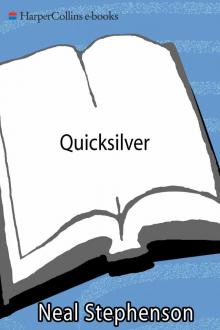 Quicksilver
Quicksilver The Mongoliad: Book Three
The Mongoliad: Book Three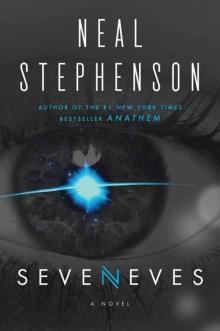 Seveneves
Seveneves Atmosphæra Incognita
Atmosphæra Incognita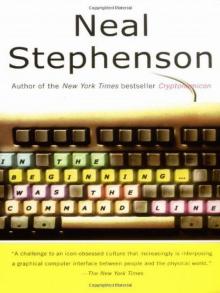 In the Beginning...Was the Command Line
In the Beginning...Was the Command Line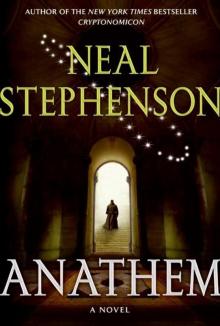 Anathem
Anathem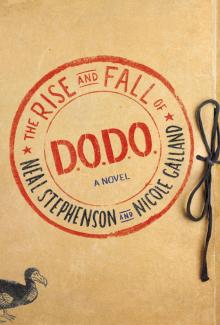 The Rise and Fall of D.O.D.O.: A Novel
The Rise and Fall of D.O.D.O.: A Novel The Mongoliad: Book Two
The Mongoliad: Book Two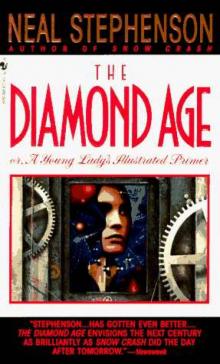 Diamond Age or a Young Lady's Illustrated Primer
Diamond Age or a Young Lady's Illustrated Primer THE System OF THE WORLD
THE System OF THE WORLD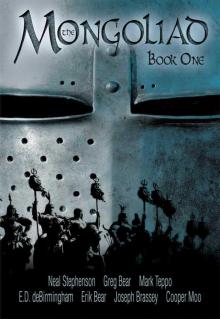 The Mongoliad: Book One tfs-1
The Mongoliad: Book One tfs-1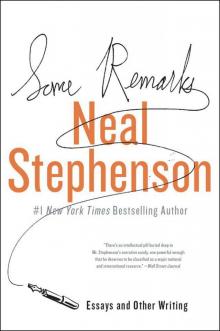 Some Remarks: Essays and Other Writing
Some Remarks: Essays and Other Writing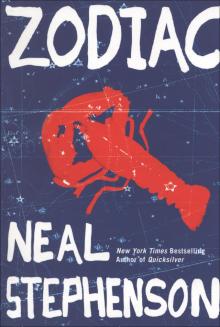 Zodiac
Zodiac Spew
Spew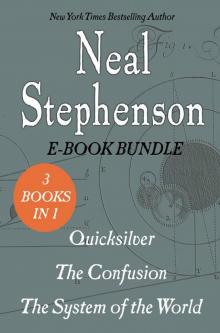 The Baroque Cycle: Quicksilver, the Confusion, and the System of the World
The Baroque Cycle: Quicksilver, the Confusion, and the System of the World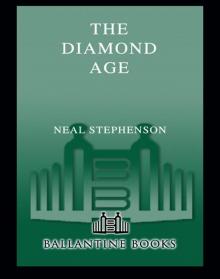 The Diamond Age
The Diamond Age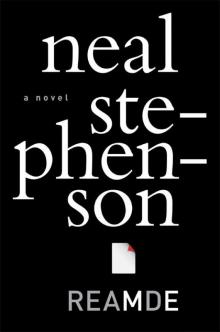 Reamde: A Novel
Reamde: A Novel In the Kingdom of Mao Bell
In the Kingdom of Mao Bell Mother Earth Mother Board
Mother Earth Mother Board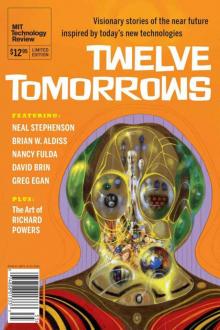 Twelve Tomorrows - Visionary stories of the near future inspired by today's technologies
Twelve Tomorrows - Visionary stories of the near future inspired by today's technologies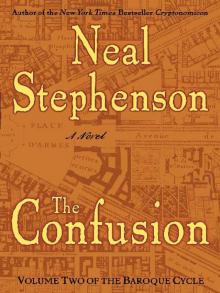 The Confusion
The Confusion The Great Simoleon Caper
The Great Simoleon Caper The Mongoliad: Book Three tfs-3
The Mongoliad: Book Three tfs-3